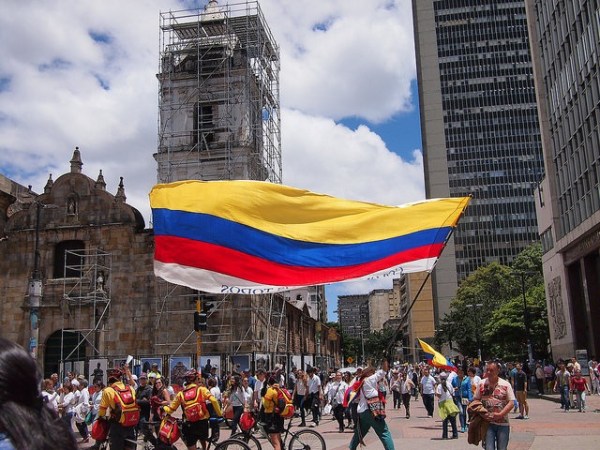By Aaron T. Bell

“Colombia somos todos/We are all Colombia” Photo Credit: Juan Carlos Pachón / Flickr / Creative Commons
Peace negotiations are back on track in Colombia – for now – after renewed violence put years of progress at risk. The unilateral cease-fire declared by the FARC last December survived the Colombian military’s continued prosecution of the war for several months, including the killing in March of José David Suarez, the head of the wealthy (and drug-trade-affiliated) 57th Front. But it was proven unsustainable after a guerrilla attack in April killed eleven soldiers, and Colombian military aerial bombardment of FARC camps in May killed 40 guerrillas, including two who had participated in the peace negotiations in Havana. The FARC formally revoked its cease-fire and resumed attacks on military and energy infrastructure targets, making June the most active month of the FARC insurgency since negotiations began two and a half years ago. At the urging of international supporters of the peace process, however, the FARC will implement a new unilateral cease-fire this week. President Santos stated that the Colombian military will de-escalate as well, but – responding to polls by Gallup and Datexco reflecting public skepticism that a negotiated settlement is possible – he has also pledged to review the situation in four months and decide whether to continue negotiations. While Santos has appointed a new Defense Minister whose public statements and record as a member of the government negotiating team indicate support for the peace talks, the President has also shaken up the military high command, promoting combat-experienced hawkish officers as commanders.
A renewed sense of urgency among negotiators appears to be emerging. Both sides have agreed to put all of the pending issues – disarmament and demobilization, compensation for victims, and transitional justice – on the table, rather than deal with them one at a time. This comes after several positive steps during the hiatus in talks:
- In late May, while airstrikes on guerrilla camps were resuming, units of the FARC and the Colombian military collaborated in several operations to remove land mines. Colombia is the second most deadly country for land mines, behind only Afghanistan, with over 2,000 people killed and another 11,000 maimed since 1990. A video on the web last week provided a dramatic example of the need for such measures – a Blackhawk helicopter exploding after landing in a minefield last month.
- On June 4 negotiators agreed on the makeup of a post-accord Truth Commission. Eleven members will have three years to identify collective (rather than individual) responsibility for abuses. It will have no mandate to recommend or impose punishment, leaving that instead for an as yet to be agreed upon transitional justice tribunal.
- Both the FARC and coca growers have called on the government to begin implementing the preliminary agreement on the illicit drug trade, including crop substitution and voluntary eradication. (Recent reports from the United Nations Office on Drugs and Crime and the White House Office on National Drug Control Policy, which use different raw numbers and data-gathering methodologies, show that coca production in Colombia rose significantly in 2014.) Even though, as InsightCrime has noted, the initiative will be hindered by the lack of a bilateral cease-fire and firm plans for demobilization, it’s a positive step.
Despite the skepticism implicit in the review it will make in four months, the Santos administration appears to be inching toward the bilateral cease-fire that the FARC has long called for. The government formerly insisted that a bilateral cease-fire would only take place after accords were signed, but has said it would consider one so long as it is “serious, bilateral, definitive and verifiable.” On the other side of the table, the FARC shows some sign of bending on the thorny matter of transitional justice. After adamantly opposing jail time for its leaders, FARC negotiators say they will consider some form of confinement for a reduced time period so long as military officials and civilian supporters of right-wing paramilitaries face similar standards of justice. This may be difficult to swallow for a Colombian military whose culpability in war crimes is bubbling to the surface, such as in a recent report by Human Rights Watch on the extrajudicial killing of thousands of civilians. The ever-present threat of military opposition to a negotiated accord, coupled with rising public skepticism, suggest the time to make concrete progress toward an accord is now. The window will not stay open long.
July 21, 2015
